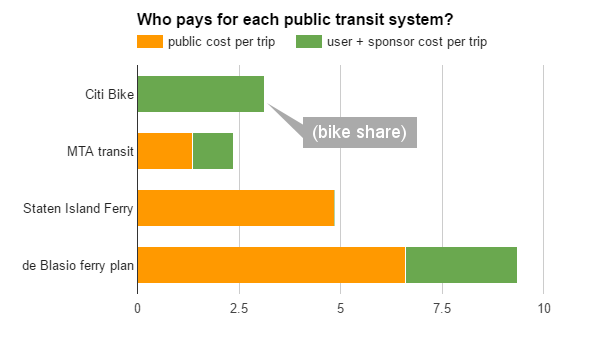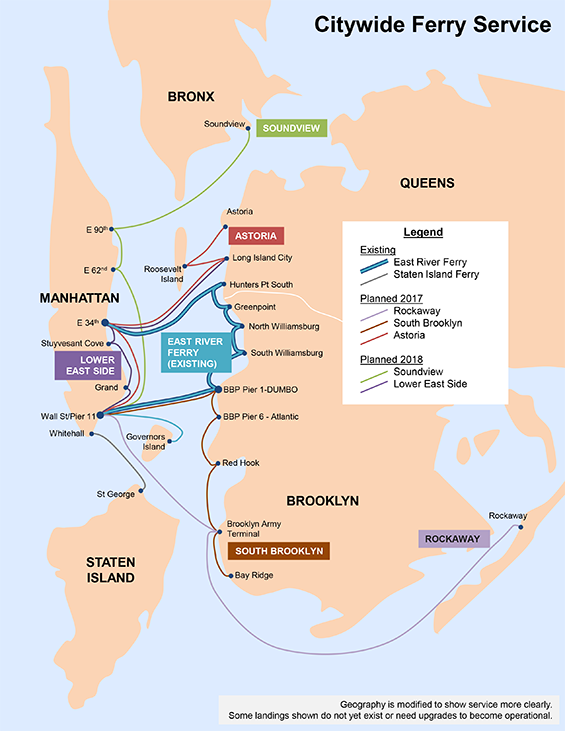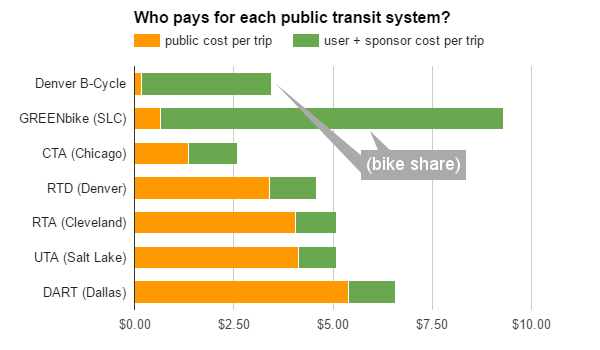Reality check: Public bike sharing costs the public virtually nothing
by Michael Andersen
August 8, 2016

Every public dollar is precious, so it makes sense when the public demands that large amounts of money not be spent on experiments.
But some people are arguing that bike sharing is no longer an experiment — and that the public might actually be able to save by spending more money on it.
That’s the argument public health researcher Lori Suzanne Schomp made last week in a blog post about New York City’s Citi Bike system, which operates with essentially zero public subsidy. Unlike virtually any transportation system in the country, including freeways and airports, all its revenue comes from users and private sponsors.
Citi Bike’s complete lack of direct taxpayer support is unusual, but in other cities the story isn’t wildly different. Many cities have launched bike share systems with federal grants or allowances. But most bike sharing systems require comparatively small public subsidies for their day-to-day operations.
Instead, most of the money comes from users and private sponsors.
In her post, Schomp contrasts this with Mayor Bill de Blasio’s current plan to spend $325 million over six years to heavily subsidize a newly expanded ferry system that won’t offer free transfers from other public transit.

Bike shares are inexpensive transit infrastructure. New York City’s executive budget 2016 was $78.3 billion and de Blasio just suggested a $325 million spend on new ferry transportation. This sizable ferry spending will increase transit options along NYC’s predominantly wealthy waterfronts and it’s been estimated to serve 85,000 people per day. The reflects heavy subsidies even as ferry rides pay transit fees. By comparison, Citi Bike served over 53,000 people in one single fine-weather day in May 2016.
The proposed ferries will serve only 35,000 more commuters than Citi Bike’s record, and yet the cost difference is sizable.
At the top of this post is a chart comparing costs and subsidies at several NYC-area public transit services, with the per-trip cost to taxpayers marked in orange. Here’s the data. Citi Bike figures are from 2015, based on net revenue per trip because Citi Bike doesn’t disclose cost per trip. MTA data are operating costs in 2014, from National Transit Database. Staten Island Ferry data are as of 2012, from SILive.com. Ferry plan cost estimates are from NYmag.com.
The story is the same outside New York: Bike sharing is minimally subsdized
What about public transit systems outside New York?
Again, taxpayers cover almost nothing when it’s a bike share system, even when (as in Denver) the cost per bike share trip is actually lower than the cost per mass transit trip.
 Denver and Salt Lake City bike share data from 2014 and 2015 annual reports; GREENbike figure includes administrative overhead as well as operations. Other data from National Transit Database, 2014. Data here.
Denver and Salt Lake City bike share data from 2014 and 2015 annual reports; GREENbike figure includes administrative overhead as well as operations. Other data from National Transit Database, 2014. Data here.
Schomp isn’t arguing that it’s bad for the public to invest in providing public transit service. Just the opposite — she’s arguing that bike sharing is a public transit service, so the public should be supporting it in order to make it better and more useful for more people.
If we did that, she argues, we might see more people getting the small, regular amounts of exercise that are widely understood to be important to physical health.
And if more people were healthier, Schomp suggests that’d be great news for taxpayers:
New York State’s FY 2017 total Federal, State and local Medicaid spending is expected to be $63 billion for the approximately 6.6 million people on Medicaid. A prima facie case follows that Medicaid spending on preventable and manageable chronic diseases is in the billions in New York City yet Medicaid members largely do not live near Citi Bike stations. Consider spending in the billions to restore health versus Citi Bike’s $35 million in annual revenues (and unknown discounts). Spending on a targeted Citi Bike discount program to foster healthy options in the first place could be financially smart.
Could be.
The Better Bike Share Partnership is a JPB Foundation-funded collaboration between the City of Philadelphia, the Bicycle Coalition of Greater Philadelphia, the National Association of City Transportation Officials (NACTO) and thePeopleForBikes Foundation to build equitable and replicable bike share systems. Follow us on Facebook, Twitter and Instagram or sign up for our weekly newsletter. Story tip? Write info@betterbikeshare.org.
